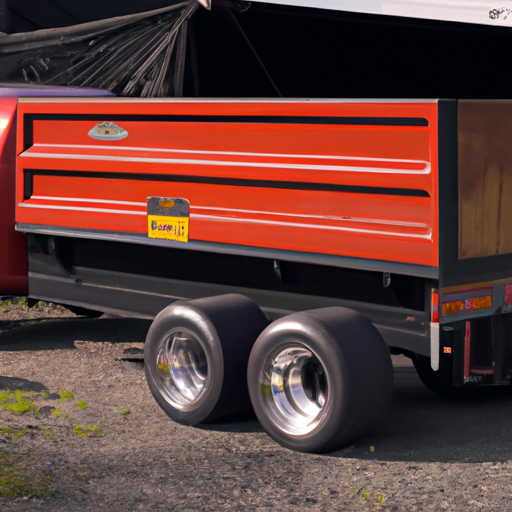-
Table of Contents
- Introduction
- The Comprehensive Guide to Understanding Dump Trailers: A Must-Read for Heavy Equipment Enthusiasts
- Mastering the Use of Dump Trailers: An Ultimate Guide for Heavy Equipment Operators
- Everything You Need to Know About Dump Trailers: A Comprehensive Guide for Heavy Equipment Users
- Q&A
- Conclusion
Introduction
The Ultimate Guide to Dump Trailers: Everything You Need to Know is a comprehensive resource that provides in-depth information about dump trailers. This guide covers all aspects, from the basic understanding of what a dump trailer is, to its various types, uses, and maintenance. It also delves into the technical specifications, safety measures, and buying considerations. Whether you are a novice or an experienced user, this guide offers valuable insights to help you make informed decisions about dump trailers.
The Comprehensive Guide to Understanding Dump Trailers: A Must-Read for Heavy Equipment Enthusiasts
Dump trailers are an essential piece of equipment for anyone involved in construction, landscaping, or any industry that requires the transportation of heavy materials. They are designed to carry and dump large amounts of debris, soil, rocks, and other materials, making them a must-have for heavy equipment enthusiasts. But what exactly is a dump trailer, and what do you need to know about them? Let’s delve into the world of dump trailers.
At its core, a dump trailer is a large, open-top container attached to a truck or other vehicle. It’s designed to haul heavy materials to a specific location and then unload or “dump” them with ease. The dumping mechanism is typically hydraulic, allowing for the efficient and effortless unloading of materials. This feature alone makes dump trailers an invaluable asset in industries where time and efficiency are of the essence.
One of the first things to consider when looking at dump trailers is their size and capacity. These trailers come in a variety of sizes, from small, single-axle trailers perfect for light-duty work, to large, multi-axle trailers capable of hauling several tons of material. The size and capacity of the trailer you choose will depend on the nature of your work and the type of materials you’ll be hauling.
Another important aspect to consider is the type of dump trailer. There are several types, each with its own set of advantages and disadvantages. For instance, rear dump trailers are the most common type and are ideal for most jobs. They dump materials out of the back, making them easy to unload. Side dump trailers, on the other hand, dump materials out of the side, which can be beneficial in certain situations, such as when space is limited.
The construction of the dump trailer is also a crucial factor to consider. Most dump trailers are made of steel or aluminum. Steel trailers are more durable and can handle heavier loads, but they are also heavier and more prone to rust. Aluminum trailers are lighter and resistant to rust, but they may not be as durable as their steel counterparts.
When it comes to purchasing a dump trailer, it’s essential to consider the quality of the trailer’s hydraulic system. This system is responsible for lifting and lowering the trailer bed, so it needs to be reliable and efficient. Look for trailers with high-quality hydraulic systems to ensure smooth operation.
Lastly, maintenance is a key aspect of owning a dump trailer. Regular maintenance can prolong the life of your trailer and keep it in good working condition. This includes checking and maintaining the hydraulic system, inspecting the trailer for any signs of damage or wear, and keeping the trailer clean to prevent rust and corrosion.
In conclusion, dump trailers are a versatile and valuable piece of equipment for anyone in the heavy equipment industry. By understanding the different types, sizes, and construction materials, as well as the importance of a quality hydraulic system and regular maintenance, you can make an informed decision when purchasing your next dump trailer. Whether you’re a seasoned professional or a heavy equipment enthusiast, understanding dump trailers is a must.
Mastering the Use of Dump Trailers: An Ultimate Guide for Heavy Equipment Operators
Dump trailers are an essential piece of equipment for any heavy-duty operation. Whether you’re in construction, landscaping, or any industry that requires hauling large amounts of materials, mastering the use of dump trailers can significantly increase your efficiency and productivity. This ultimate guide will provide you with everything you need to know about dump trailers and how to use them effectively.
Firstly, it’s important to understand what a dump trailer is. Essentially, it’s a large, open-top trailer that can be filled with various materials such as sand, gravel, or debris. The trailer is designed to be easily unloaded by tipping the bed and allowing the contents to slide out the back. This simple yet effective design makes dump trailers an invaluable tool for many industries.
Now, let’s delve into the specifics of operating a dump trailer. The first step is to ensure that the trailer is properly hitched to your vehicle. This involves checking the hitch, safety chains, and electrical connections. It’s crucial to ensure that everything is secure before you start loading the trailer.
Next, you need to load the trailer. This might seem like a straightforward task, but there are a few things to keep in mind. Firstly, you should always load the trailer evenly to maintain balance. An uneven load can cause the trailer to tip or sway, which can be dangerous. Secondly, you should never overload the trailer. Each trailer has a specific weight capacity, and exceeding this can damage the trailer and put you at risk.
Once the trailer is loaded, you’re ready to hit the road. However, driving with a dump trailer is a bit different than driving without one. You’ll need to take wider turns, allow for more stopping distance, and be aware of the extra length when changing lanes or parking. It’s also important to regularly check your mirrors to keep an eye on the trailer and its load.
Unloading the dump trailer is where the real magic happens. With the push of a button, the hydraulic system lifts the bed of the trailer, and the load slides out the back. However, there are a few safety precautions to keep in mind. Always ensure that the area behind the trailer is clear before unloading. Also, be aware of overhead obstacles like power lines or tree branches that could interfere with the raised bed.
Lastly, maintenance is key to keeping your dump trailer in top shape. Regularly check the hydraulic system for leaks, keep the electrical connections clean and dry, and inspect the trailer for any signs of damage or wear. Proper maintenance will extend the life of your trailer and ensure it’s always ready for the next job.
In conclusion, mastering the use of dump trailers involves understanding their design, knowing how to load and unload safely, driving with care, and maintaining the trailer properly. With these tips in mind, you’ll be well on your way to becoming a pro at operating dump trailers. Remember, safety should always be your top priority. Happy hauling!
Everything You Need to Know About Dump Trailers: A Comprehensive Guide for Heavy Equipment Users
Dump trailers are an essential piece of equipment for anyone involved in heavy-duty work, such as construction, landscaping, or farming. They are versatile, durable, and designed to handle heavy loads, making them a valuable asset for any heavy equipment user. But what exactly is a dump trailer, and what do you need to know about them? Let’s dive in.
A dump trailer, at its most basic, is a large, open-top trailer that can be filled with various materials and then hydraulically tilted to dump the load. They come in a variety of sizes and styles, from small, single-axle trailers designed for light-duty work to large, multi-axle trailers capable of hauling tens of thousands of pounds.
One of the first things to consider when looking at dump trailers is the type of material you’ll be hauling. For lighter materials like mulch or gravel, a smaller trailer may suffice. However, for heavier materials like rocks or construction debris, you’ll need a larger, more robust trailer. The type of material can also affect the type of dump trailer you need. For instance, some trailers are specifically designed for hauling loose materials, while others are better suited for large, bulky items.
Another important factor to consider is the dump trailer’s capacity. This refers to the maximum amount of weight the trailer can safely carry. Overloading a dump trailer can lead to serious safety issues, including tipping or structural failure, so it’s crucial to know your trailer’s capacity and stay within it.
The method of dumping is another key aspect to consider. Most dump trailers use a hydraulic system to lift the trailer bed and dump the load. However, the specifics of this system can vary. Some trailers have a single hydraulic cylinder, while others have multiple cylinders for more power. Additionally, some trailers dump straight back, while others can dump to the side for added versatility.
The construction of the dump trailer is also important. Look for a trailer made from high-quality materials that can withstand the rigors of heavy-duty work. The trailer’s frame should be sturdy and well-built, and the bed should be made from a durable material like steel or aluminum.
Finally, consider the dump trailer’s ease of use. Some trailers come with features like remote controls for the hydraulic system, making them easier to operate. Others have features like removable sides or a roll-off design that makes loading and unloading easier.
In conclusion, a dump trailer is a versatile and valuable piece of equipment for anyone involved in heavy-duty work. By considering factors like the type of material you’ll be hauling, the trailer’s capacity, the method of dumping, the construction of the trailer, and its ease of use, you can find the perfect dump trailer for your needs. Remember, safety should always be your top priority, so always stay within your trailer’s capacity and follow all manufacturer’s instructions. With the right dump trailer, you can make your heavy-duty work easier, safer, and more efficient.
Q&A
1. Question: What is a dump trailer?
Answer: A dump trailer is a type of haulage vehicle that is designed to unload cargo by tipping the trailer bed upwards, causing the load to slide or ‘dump’ out.
2. Question: What are some uses of dump trailers?
Answer: Dump trailers are commonly used in construction and agriculture to transport materials such as sand, gravel, soil, grain, or demolition waste. They can also be used for residential purposes like home renovations or garden clean-ups.
3. Question: What should one consider when buying a dump trailer?
Answer: When buying a dump trailer, one should consider factors such as the size and capacity of the trailer, the type of materials it will be used to transport, the type of hydraulic system it uses, the quality of its construction, and the reputation of the manufacturer.
Conclusion
The Ultimate Guide to Dump Trailers provides comprehensive information about dump trailers, including their types, uses, maintenance, and safety measures. It is an essential resource for anyone interested in or involved with dump trailers, offering valuable insights into their operation and benefits. The guide emphasizes the importance of understanding the specific features and requirements of different dump trailers to ensure their efficient and safe use.



JILI Games – best jili slot online in the Philippines
Free Spins 1000+ Free Demo Slot
Openning Bonus 120% piso
Searching JILI Games+hawkplay888 ᧐n Google oг Bing tо get free coins
jili games